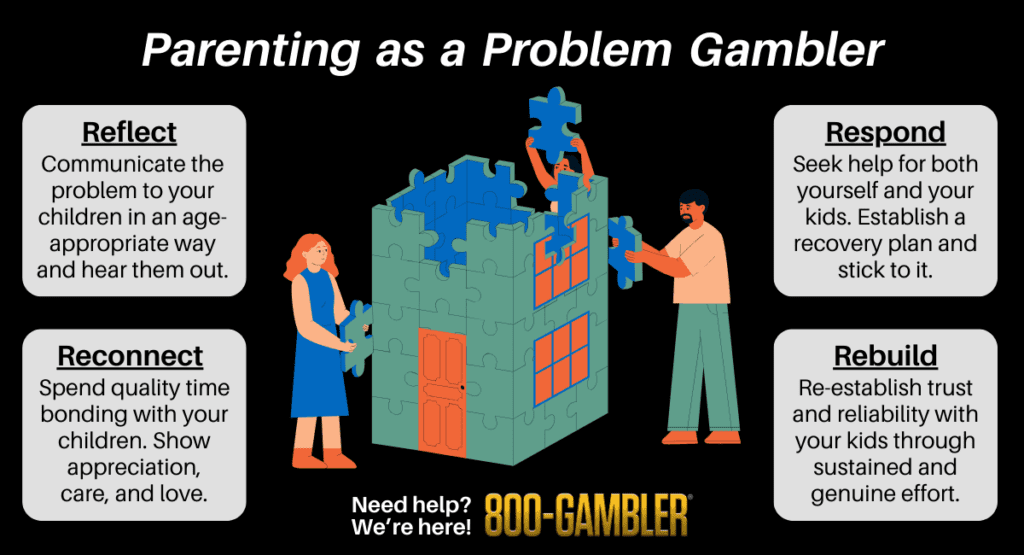Problem gambling can have a major impact on every part of life, including parenting. For those on a recovery journey, the challenges of rebuilding trust, managing family finances, and setting a positive example for younger children and adult children alike can feel overwhelming. However, with the right support system and strategies, a gambling parent can quit gambling, rebuild relationships, and create a stable, healthy home environment.

Acknowledging the Challenges of Parenting in Gambling Recovery
Recovering from problem gambling is not just about stopping the gambling behavior; it’s about addressing the financial harm, mental health issues, and other negative impacts that come with it. Children affected by someone else’s gambling problem may experience heightened stress, develop anxiety about not having enough money for essentials, or even feel angry, guilty, or confused. As a parent, it’s important to acknowledge these challenges and take proactive steps to support their emotional well-being.
Open communication is key. Parents should reassure their children that they are not responsible for their financial problems or other gambling-related harm. Keeping communication open helps children feel heard and supported, making it easier for the whole family to relieve stress and heal together.
Managing Family Finances and Rebuilding Trust
One of the biggest obstacles that problem gamblers face in recovery is restoring financial stability. Losing money through problem gambling can have long-term negative impacts on your family’s financial well-being, affecting everything from daily expenses to savings for the future. To rebuild trust with family members and demonstrate responsible money management, consider these steps:
- Use separate bank accounts: Establishing separate bank accounts ensures financial responsibilities are met without your own situation interfering.
- Establish a family budget: A structured plan for family spending helps ensure enough money is allocated for essentials while also setting aside extra money for fun, responsible family activities.
- Seek professional help: A credit repair expert or financial advisor can provide guidance on overcoming financial harm caused by problem gambling.
- Avoid handling family finances alone: In extreme cases, allowing your spouse or another trusted family member to oversee major financial decisions or help manage your bank accounts can help maintain accountability.
By taking these actions, gambling parents can show their commitment to financial responsibility and reassure their family members that they are prioritizing their well-being over gambling urges.
Creating a Healthy, Supportive Home Environment
A stable home environment plays a vital role in child development and overall family harmony. Problem gambling can cause negative consequences such as emotional blackmail, lack of trust, and family instability. To promote a positive atmosphere, consider implementing these strategies:
- Prioritize family activities: Spending time together in healthy, engaging ways fosters strong connections. Board games, outdoor outings, and movie nights can help reinforce the family bond.
- Encourage regular exercise: Physical health is just as important as mental well-being. Exercising as a family can relieve stress and create positive habits.
- Practice self-care: Parents in recovery should focus on their own physical and mental health to be their best selves for their children.
- Develop coping skills: Recovery can be extremely difficult, but healthy coping mechanisms (such as journaling, meditation, and seeking therapy) can help manage stress and prevent relapse.
Through these efforts, parents can rebuild trust and demonstrate resilience, teaching children valuable life lessons about overcoming adversity.
Seeking Support to Strengthen Recovery and Parenting
No one has to go through recovery alone. Seeking help through support groups or professional guidance can provide the necessary tools to maintain progress. Family therapy can also be beneficial in addressing underlying issues and helping the whole family heal from the negative impacts of gambling.
Group therapy and self-help groups offer a sense of community and encouragement, reducing feelings of isolation. Additionally, speaking with a mental health professional can help address personal struggles that may contribute to gambling problems. In extreme cases, professional intervention may be necessary to prevent further harm to family members.
It’s important to remember that while gambling problems may have caused hurt in the past, positive change is always possible. Parents who take active steps to stop gambling, seek support, and set a healthy example will show their children that overcoming challenges is achievable with determination and the right resources.
Take the First Step Toward a Future Free of Problem Gambling
Parenting while recovering from a gambling problem can be challenging, but it is also an opportunity to set a strong example of perseverance, responsibility, and positive change. By spending time prioritizing physical and mental health, connecting with self-help groups, keeping communication open, and seeking professional help, parents struggling with problem gambling can improve their own finances and create a healthier home for themselves and their children.
If you are struggling with a gambling problem or dealing with the consequences of someone else’s gambling problem, 800-GAMBLER is here to help. Even if you feel isolated, remember that you are not the only person facing these challenges, and there is always a way forward. Call our toll-free and confidential 24/7 helpline today to connect with support groups, help meetings, and other resources that can support your recovery journey and help you build a brighter future for your family.



